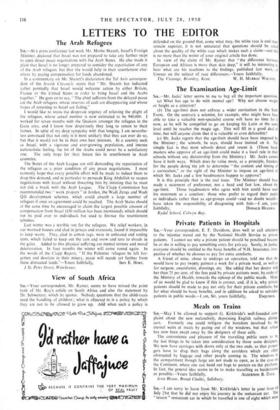The Examination Age-Limit
SIR,—Mr. Jacks' letter seems to me to beg all the important questions.
(a) What has age to do with mental age? Why not choose weight or height as a criterion?
(b) The age-limit does not enforce a wider curriculum in the Sixth Form. On the contrary a scientist, for example, who might have been able to take a valuable non-specialist course will have no time for it now, as he will be compelled to go on keeping his Latin at the same level until he reaches the magic age. This will fill in a good deal of time, but will anyone claim that it is valuable or even defensible?
(e) Mr. Jacks regrets that the age-limit should have been imposed by the Minister ; the schools, he says, should have insisted on it. The simple fact is that most schools detest and resent it. (Those head- masters who approve of an age-limit could make it a local rule in their schools without any dictatorship from the Ministry.) Mr. Jacks cannot have it both ways. Which does he value more, as a principle, freedom for the people doing the job to determine " the content and timing of a curriculum," or the right of the Minister to impose an age-limit of which Mr. Jacks and a few headmasters happen to approve?
It is this principle that is the real issue. The -Minister should have made a statement of preference, not a hard and fast law, about the
age-limit. Those headmasters who agree with him could have used his statement as a sanction: those who prefer to regard their pupils as individuals rather than as age-groups could—and no doubt would— have taken the responsibility of disagreeing with him.—I am, yours


































 Previous page
Previous page